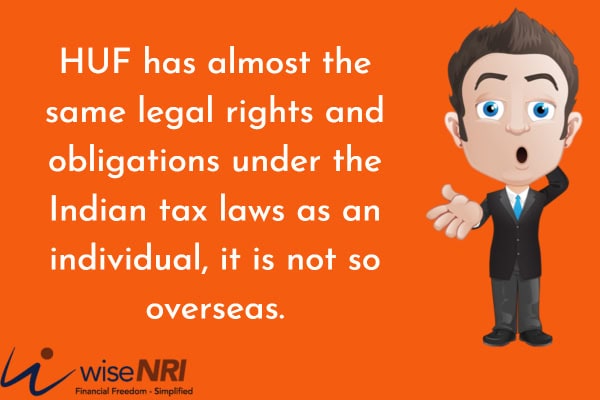Navigating the complexities of Non-Resident Indians (NRIs) and Hindu Undivided Families (HUFs) can be challenging, especially when it comes to taxation, legal compliance, and financial planning. Whether you’re an NRI looking to manage your Indian assets or a member of an HUF dealing with inheritance and taxation concerns, understanding the key issues is crucial. In this post, we’ll explore the common challenges faced by NRIs and HUFs, along with essential insights to help you stay informed and compliant.
What is a Hindu Undivided Family?
A Hindu Undivided Family or HUF is a unique construct in the Indian society and by that extension the Indian Tax laws. It is a socio/economic entity among people sharing a common lineage and ancestors with their spouses and unmarried children. By definition, all the family members are members of the HUF.
The benefit of forming a HUF, a legal entity to conduct your business as a family unit, is available only to Hindus, Jains, Buddhists, and Sikhs in India. To start a HUF, one must get married and start a new family unit. The Karta – traditionally the eldest male in the family – acted as the manager of the family affairs, and all other members are called co-parceners.
Till the amendments to the Hindu Succession Act, 1956 in 2005 came into force, only sons and unmarried daughters were part of a HUF. But with this amendment, all family members, whether male or female, married or unmarried, are equal partners. Due to the 2005 amendments, now females can also take on the role of family elder or Karta.

Check – Who is NRI
Tax residency of HUF
In most cases, the HUF enjoys the same benefits as an individual. They can claim similar tax deductions & rebates and are subject to similar treatment for clubbing of income and tax residency.
The Income Tax Act, 1961 defines different classes of tax residency to determine whether someone is liable to pay taxes on their foreign income in India or not. These different residential statuses apply not only to individuals but also to a Hindu Undivided Family.
The tax incidence of a HUF, like an individual, depends on its tax residency. The HUF can have one of the following residential statuses:
- Resident and ordinarily resident in India
- Resident but not ordinarily resident in India (RNOR)
- Non-resident
The residential status of a HUF can change every year – it means the HUF can be Resident in one year, Non-resident in the next and, Resident but not ordinarily resident in India (RNOR) the next.
Determination of the Residential Status of a HUF
Section 6(2) of the Income Tax Act, 1961 lays down the rules to determine the residential status of a HUF. As a first step, it is ascertained if the HUF is a resident or a non-resident. In the second step, if the HUF was a resident, then if it is an ordinary resident or is an RNOR.
Step 1) Resident or Non-resident
For a given financial year, a HUF will be considered as a Resident in India, if the control and management (partly or wholly) of the affairs of the HUF is in India for that financial year.
Step 2) If Resident, then Ordinarily Resident or Not Ordinarily Resident in India
If the Karta (the manager) of the HUF satisfies both of the following conditions, then a Resident HUF will be treated as Resident and Ordinarily Resident in India during the said financial year:
- The Karta is Resident in India for at least 2 years out of 10 financial years immediately preceding the relevant financial year.
- The Karta has stayed in India is for 730 or more days during the immediately preceding 7 financial years.
If the Karta of a Resident HUF does not satisfy any of these conditions (remember even one), then the HUF will be treated as Resident but Not Ordinarily Resident (RNOR) in India.
Control and Management of HUF
The conditions laid to determine the non-resident status of the HUF rests solely on its “Control and Management” is in India. Usually, the location of the family manager/Karta has the control and management of the HUF, and therefore his place of residence is a crucial factor.
But there can be certain situations where it may not be apparent if the “control and management” of a HUF were in India or not for the given financial year. For example:
- If the HUF has a residence – ancestral or otherwise – in India, it does not constitute that place to be the seat of “control and management.” The “control and management” are located where the decisions concerning the family affairs are actually made.
- In many cases, the Karta may delegate the responsibility to any of the coparcener(s) to control and manage the family affairs. In that case, the residential status of such co-parcener(s) becomes more material, than that of the Karta.

Read – Penalty of not declaring NRI status
Issues faced by Non-resident HUFs
1. Residential Status
Among the many issues faced by the non-resident HUFs is the onus of proving the residential status of the HUF during a financial year. The vagueness of the term “Location of the Control and Management (wholly or partly)” leaves too much to the interpretation of the person concerned.
2. Account Opening
Another problem that non-resident HUFs frequently face is related to the opening of NRE or FCNR bank accounts to invest in India. There is no directive from either the RBI or the Income Tax Department barring such an account. (Check the RBI FAQs on Accounts in India by Non-residents.)
But as things go in India, if there is no explicit clarity on an issue, most government agencies err on the side of being too cautious. Many of our NRI clients have raised this issue that the banks (especially in the public sector) ask them to first seek written permission from the RBI for opening a non-resident HUF’ bank account!
Some NRIs have suggested going as far as to first open an NRI HUF account in HDFC Bank or ICICI Bank – to create a paper trail. Then use this account to open an NRI HUF account in a PSU bank. The obsession with PSU banks is not because of their superior services (read our survey results <<Issues NRIs Face With Their Banks>> and <<Which Bank Is Best for NRI Banking Services>>). The sole reason is the large branch network of PSBs.
-
HUF Formed Overseas
The concept of recognizing an undivided family as a legal entity for commercial laws and contracts is unique to India. Therefore, though the HUF has almost the same legal rights and obligations under the Indian tax laws as an individual, it is not so overseas. You can get a PAN card and Bank account opened in the name of the HUF that is managed by Karta.
Therefore, you cannot expect authorities in any other jurisdiction to understand the concept as well as legally register a HUF outside of India.
-
Non-availability of the LRS
The RBI’s new scheme called the Liberalised Remittance Scheme or LRS allows a resident individual to remit up to $2,50,000 per financial year for a permissible revenue or capital expenditure. This scheme is not open for HUF including for corporates, partnerships, and Trusts.
Please share your experience if you have an HUF in India, and feel free to ask any questions in the comment section.
